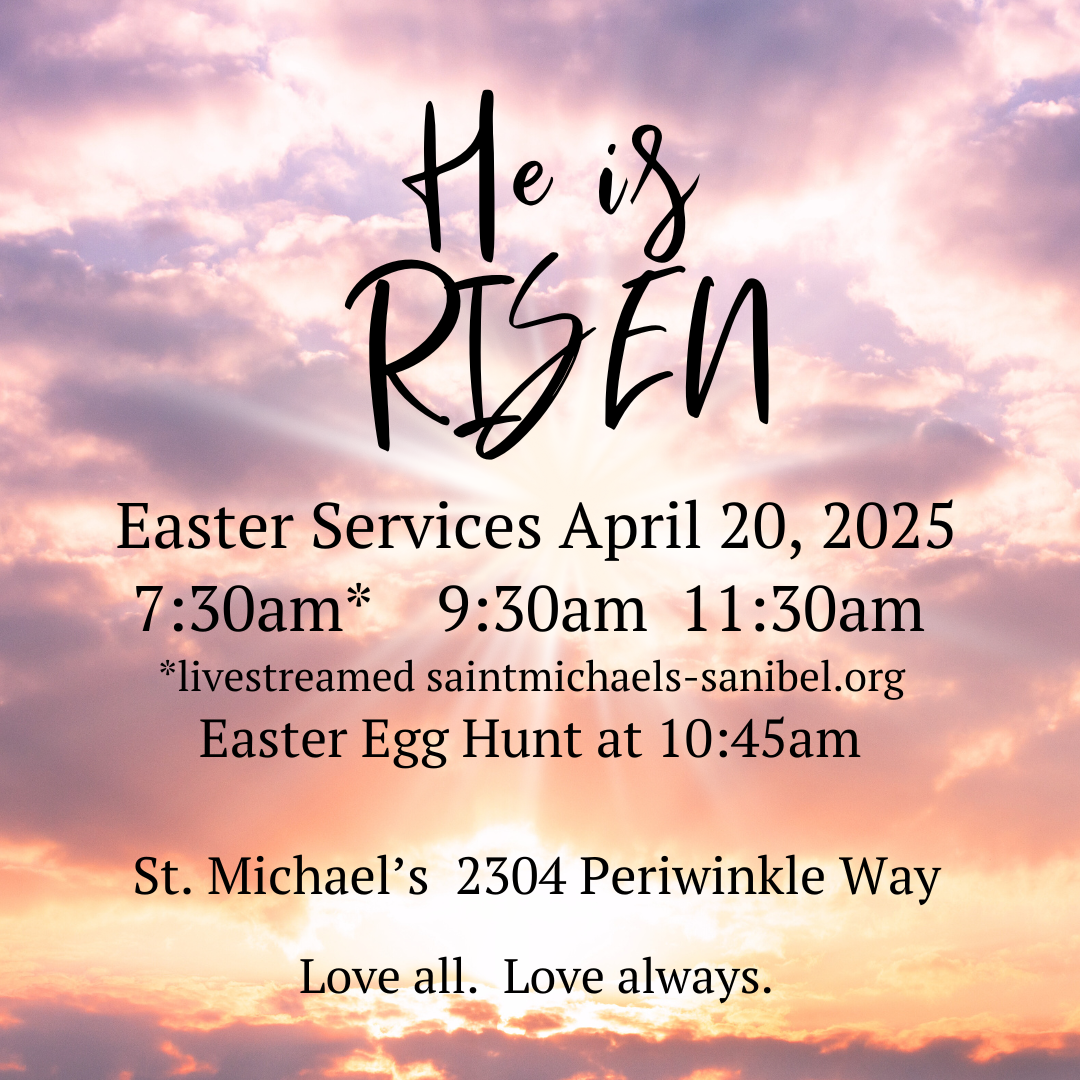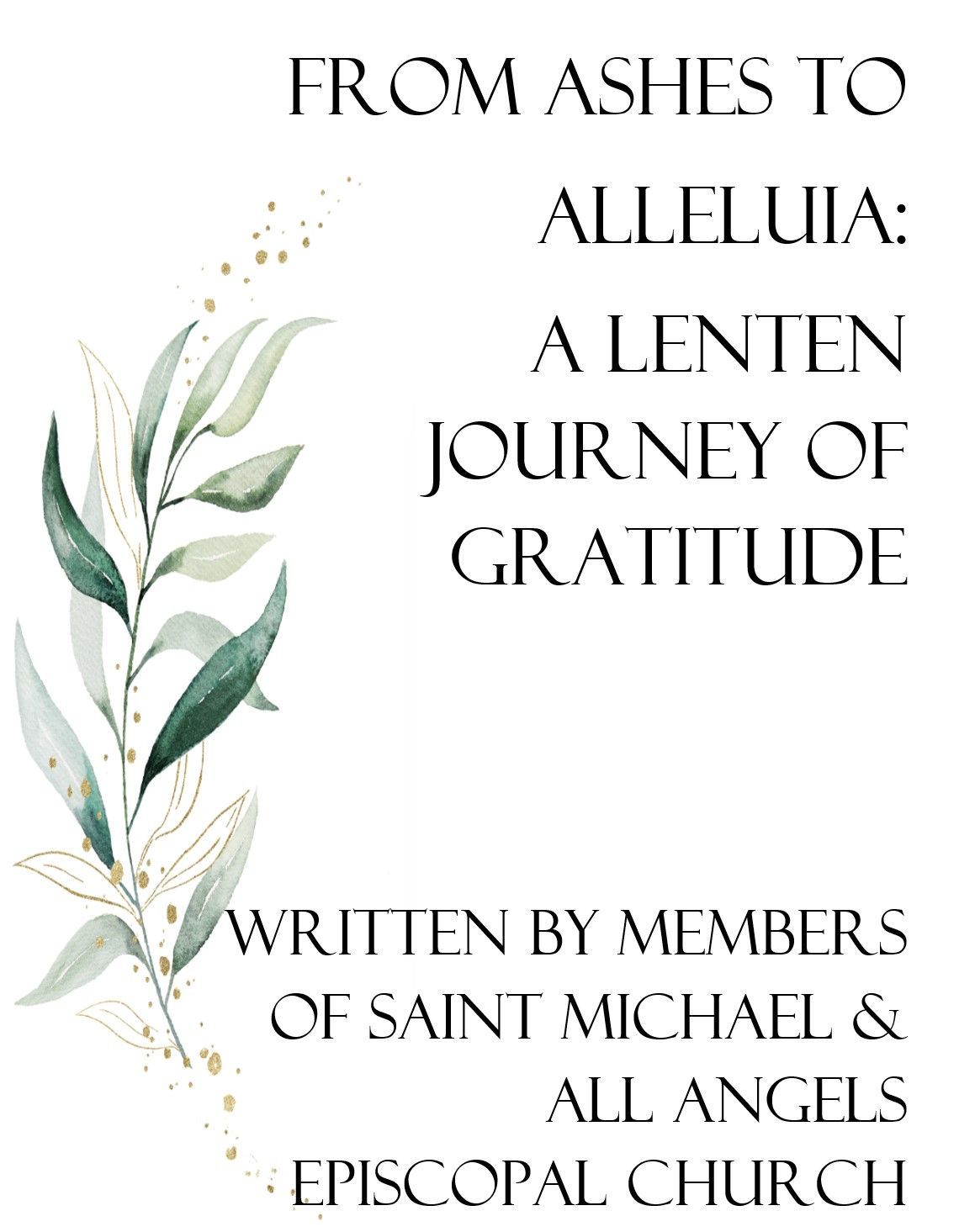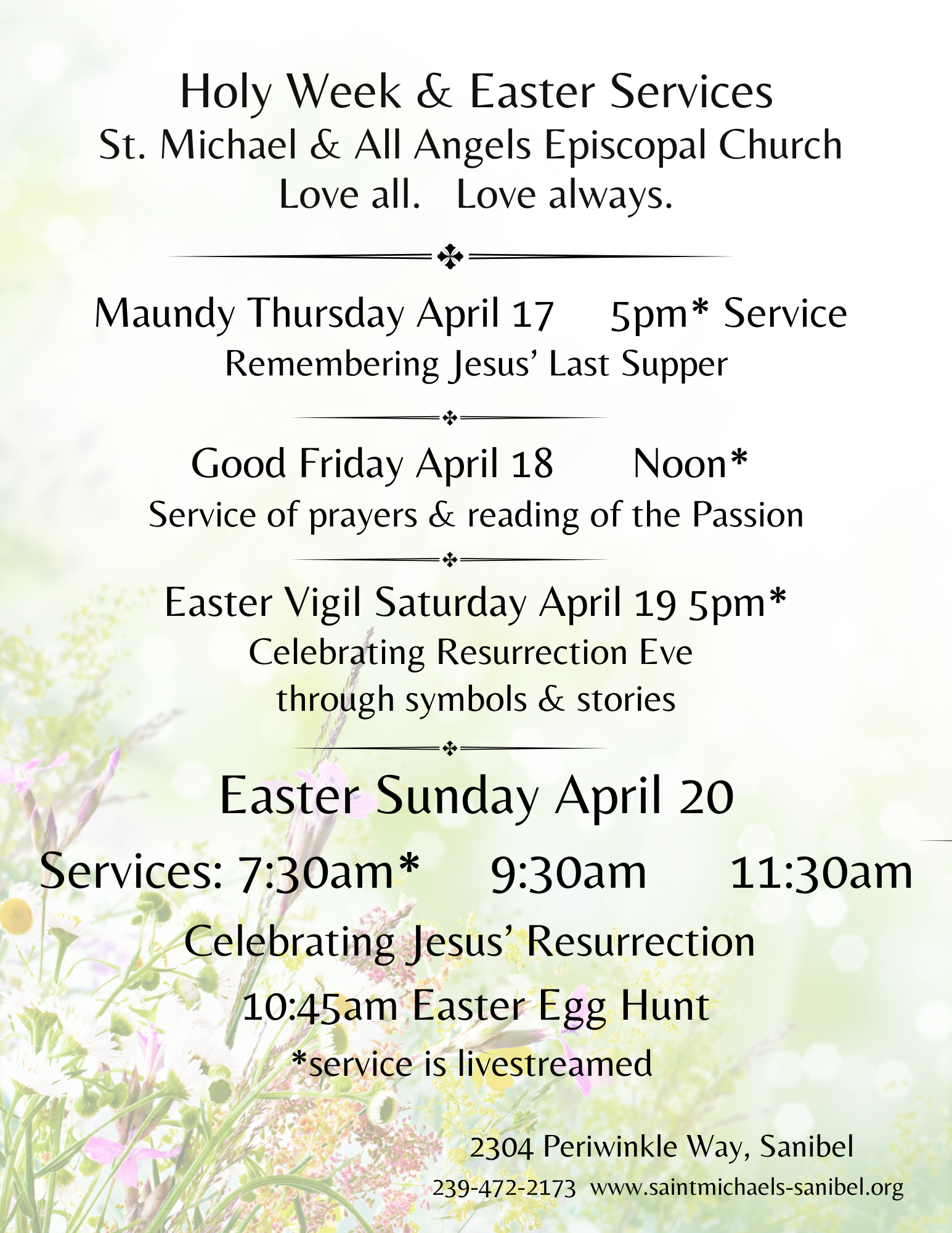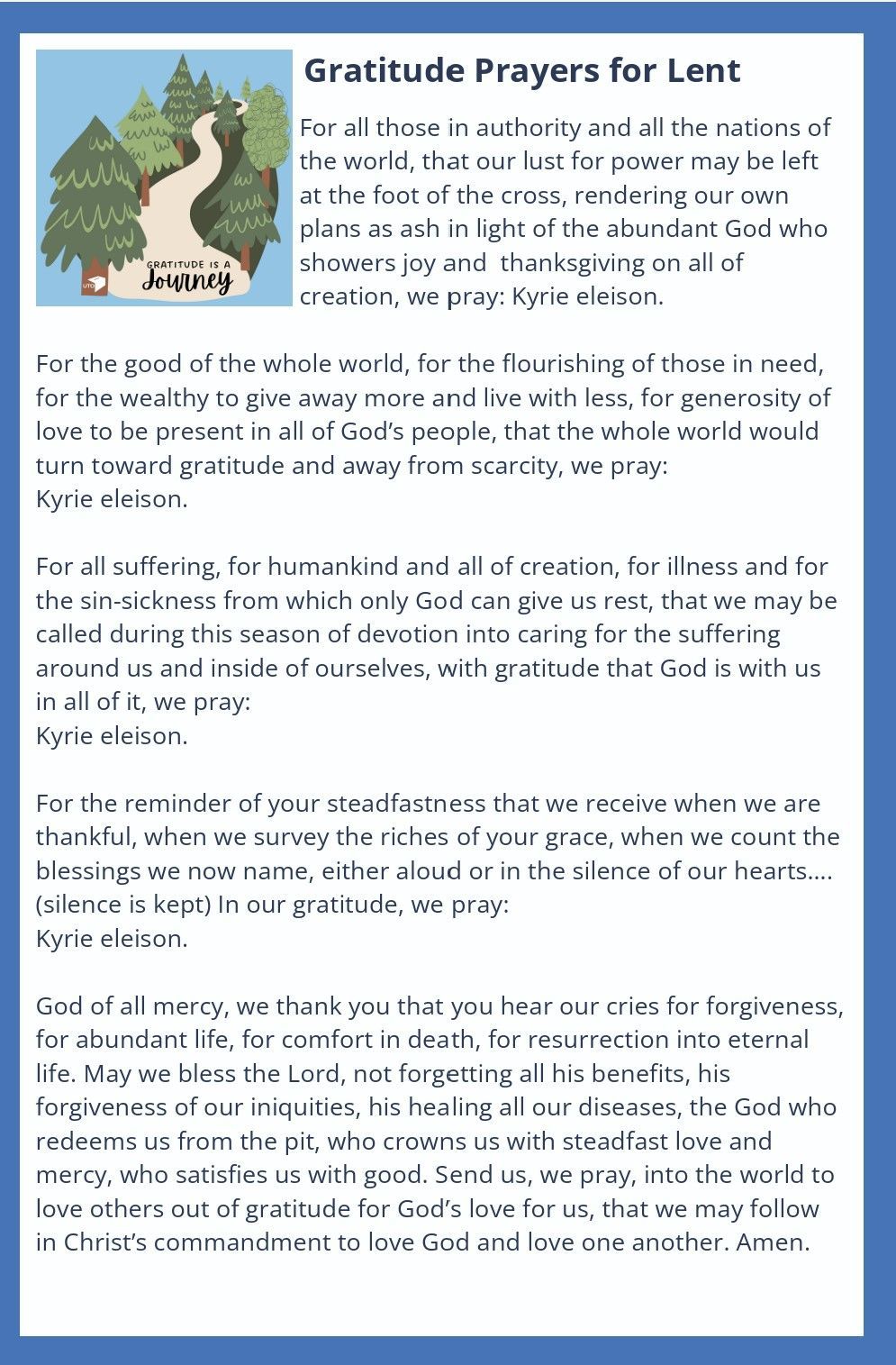The Episcopal Church has several resources that they produce each year to help people enter into the season of Lent. Click on the image to be taken to their website.
LENT
The Season of Lent
A time for personal and collective transformation
“Lent” comes from the Anglo-Saxon word lencton – meaning “spring” or “lengthening” from the time of year when the days grow long. The season begins on Ash Wednesday (March 5, 2025 ) and ends with the Easter Triduum (Maundy Thursday through Easter Day, April 20, 2025).
Our theme this year is 40 Days of Welcome and Gratitude which is a call to give thanks for the ways we experience welcome/hospitality, in our homes, communities, and through the ways we care for ourselves and our stories. Our hope is that during the 40 days of Lent, we can all use gratitude to help us be more welcoming in the world around us.

Lent in a Bag 2025
Some resources to help you engage in simple spiritual practices during the season of Lent (and beyond).
A 40 day devotional with reflections on gratitude, welcome and scripture readings written by members of St. Michael's to inspire and uplift.

Lenten Micropractice Cards- simple spiritual practices
You can download these Lenten Micropractices and cut them up into individual cards. There will be a new practice to guide you each day of Lent, but don't be stressed if you don't get to one each day! The important thing is just to try some new ways of getting closer to God. Some practices can be done on the spot, some during the day, and others will take some time and/or prep work.
Traditionally, there are three pillars of Lent: praying, fasting, and alms giving, which come to us from Matthew 6:1-18. These micropractices rotate through these themes, along with additional practices that don’t fit neatly in one of those categories (“more”).

Community Meditation Room now open at St. Michael's
I’m excited to announce the opening of our new Meditation Room, located next to the kitchen with it’s own exterior entrance off the back parking lot. The goal of the St. Michael’s Meditation Room is to provide a quiet, sacred space where individuals can pray, reflect, and connect with God in a personal and peaceful environment. The meditation room is designed for solitude and introspection, allowing visitors to deepen their spiritual journey without distractions.
- Encouraging Personal Prayer & Reflection – It offers a space for individuals to meditate on Scripture, pray for guidance, or express gratitude. There are several baskets around the room with gratitude cards, scripture quotes, and brief meditation practices. Items marked “take home” can be taken with you, or given to someone you know who might appreciate them. These include prayer bears, mini prayer shawls, scripture bookmarks, and angel wings.
- Prayers, Praises & Meditation Wall- a feature of the room is an interactive wall. There are three different colors of tags to write a Prayer request (blue tag), a praise/gratitude thought (green), or an inspiring thought, quote or scripture passage (white) and then hang on the wall. There are detailed instructions in the room. The prayer requests will be prayed for each week by members of our Pastoral Care Team. For private prayer requests, there is a designated box where you can place your request tag. Rest assured that the prayer team members will prayer for your request in confidence.
- Providing a Retreat from Daily Life – The room serves as a refuge from the noise and busyness of the world, promoting inner peace. It has additional soft lighting so the overhead lights don’t have to be used, and a variety of comfortable seating options and calming window treatments. It can be accessed anytime using the exterior door.
- Facilitating Spiritual Growth – Through silence and contemplation, parishioners and visitors from the community can deepen their faith and relationship with God. There are a variety of items throughout the room to inspire and encourage you in your faith journey.
I encourage everyone to stop into the Meditation Room anytime, whether on the weekend or during the week and sit in this beautiful space for a few minutes. It is a wonderful place to find calm, peace and consolation in an otherwise busy, and chaotic world.
Peace, Fr. Bill Van Oss


2025 Lenten Calendar- 40 Days of Welcome & Gratitude
40 Days of Welcome and Gratitude is a call to give thanks for the ways we experience welcome/hospitality, in our homes, communities, and through the ways we care for ourselves and our stories. Our hope is that during the 40 days of Lent, we can all use gratitude to help us be more welcoming in the world around us.. Click on the title above for a hard copy of the calendar, or you can sign up to receive a daily text message during Lent.
2025 Lenten Challenge Calendar for Families
a calendar for our families that is similar to the one we have for adults. Each day kids will get a question to discuss or a challenge to help them practice gratitude and welcome in new ways.

Fasting and Feasting During Lent:
Make more room for God this Lent by choosing not to do some things (fasting) and by choosing to do other things (feasting). Fasting is an integral part of Lent. Traditionally it has included reducing the amount of food we eat and abstaining from meat. We fast to allow our physical hunger to remind us of our spiritual hunger, our need for God. The purpose of fasting is to turn our attention to both God and others.
Things to fast from…
- watching television • buying new things: clothes, music, magazines, jewelry • snack or junk foods • being angry at other people • holding resentments • gossiping • being negative
Feasting: The dictionary defines a feast as “something that gives unusual or abundant pleasure.” Jesus tells us what gives us the most real and lasting joy: it is sharing ourselves in love for others, for our friends, our family, and also for our neighbors in need. During Lent, we pay attention to feasting on joy, compassion, service, and hope so that we might grow in faith all year long.
Things to feast on...
- prayer • acts of kindness to others • forgiveness • participating in online church offerings • acts of service and charity • giving money or food/clothing to people who are hungry or in need.




